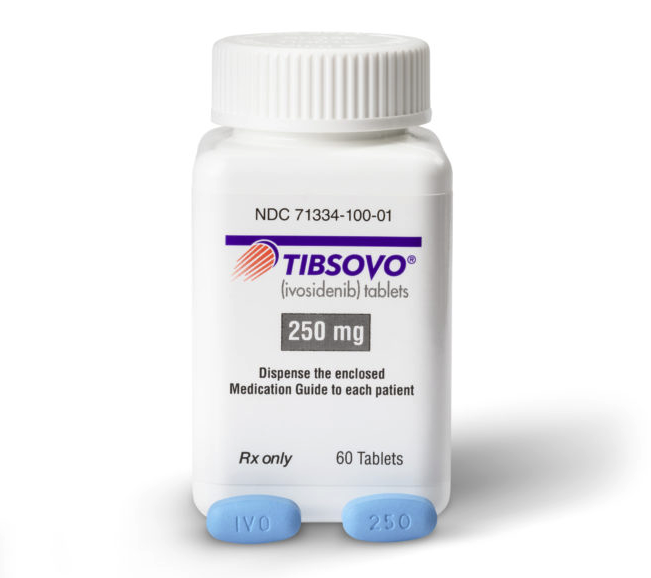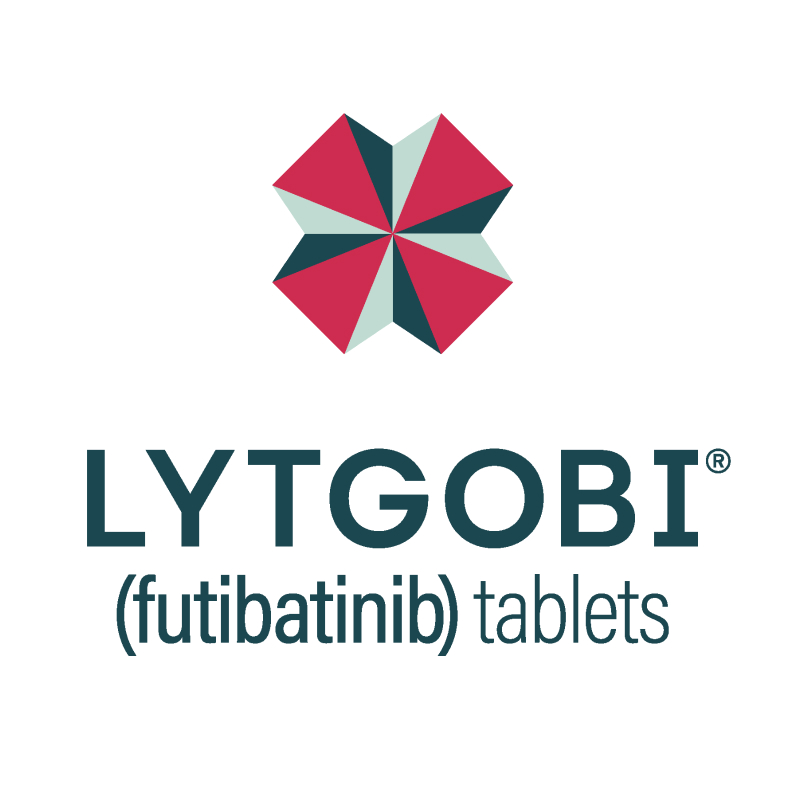Tibsovo (ivosidenib) vs Lytgobi (futibatinib)
Tibsovo (ivosidenib) vs Lytgobi (futibatinib)
Tibsovo (ivosidenib) is an oral medication specifically approved for the treatment of acute myeloid leukemia (AML) with a susceptible IDH1 mutation, as detected by an FDA-approved test. Lytgobi (futibatinib), on the other hand, is an oral kinase inhibitor used for the treatment of adults with previously treated, unresectable, locally advanced or metastatic intrahepatic cholangiocarcinoma with a fibroblast growth factor receptor 2 (FGFR2) fusion or other rearrangement, as detected by an FDA-approved test. The choice between Tibsovo and Lytgobi would depend on the type and genetic profile of the cancer being treated, as they target different mutations and are used for distinct cancer types.
Difference between Tibsovo and Lytgobi
| Metric | Tibsovo (ivosidenib) | Lytgobi (futibatinib) |
|---|---|---|
| Generic name | Ivosidenib | Futibatinib |
| Indications | Acute myeloid leukemia (AML) with a specific genetic mutation (IDH1) | Previously treated, unresectable, locally advanced or metastatic intrahepatic cholangiocarcinoma with a FGFR2 fusion or other rearrangement |
| Mechanism of action | Inhibits the mutant IDH1 enzyme, leading to decreased levels of the oncometabolite 2-hydroxyglutarate (2-HG) | Fibroblast growth factor receptor (FGFR) inhibitor |
| Brand names | Tibsovo | Lytgobi |
| Administrative route | Oral | Oral |
| Side effects | Fatigue, leukocytosis, arthralgia, diarrhea, dyspnea, edema, nausea, mucositis, QT interval prolongation, rash, fever, cough, constipation | Hyperphosphatemia, alopecia, diarrhea, fatigue, dry mouth, onycholysis, stomatitis, decreased appetite, dry skin, musculoskeletal pain, nausea, vomiting |
| Contraindications | Known hypersensitivity to ivosidenib or any of its components | Known hypersensitivity to futibatinib or any of its components |
| Drug class | IDH1 inhibitor | FGFR inhibitor |
| Manufacturer | Agios Pharmaceuticals, Inc. | Taiho Oncology, Inc. |
Efficacy
Efficacy of Tibsovo (Ivosidenib) in Treating Bile Duct Cancer
Tibsovo (ivosidenib) is a targeted therapy approved by the U.S. Food and Drug Administration (FDA) for the treatment of adult patients with previously treated, locally advanced or metastatic cholangiocarcinoma (bile duct cancer) that harbors an isocitrate dehydrogenase 1 (IDH1) mutation. The efficacy of Tibsovo in bile duct cancer was demonstrated in a multicenter, single-arm, open-label clinical trial. The trial's primary endpoint was overall response rate (ORR), which reflects the proportion of patients who experienced a significant reduction in tumor size. The results showed that Tibsovo achieved an ORR of 36% in patients with IDH1-mutated cholangiocarcinoma, with 2.4% of patients having a complete response and 33.6% having a partial response.
Furthermore, the duration of response (DOR) was another critical measure in the trial. Among the responders, 63% had a DOR of six months or longer, indicating that the responses were durable for a significant period. These results suggest that Tibsovo can be an effective treatment option for patients with this specific genetic mutation in bile duct cancer, offering a promising alternative for those who have exhausted other treatment options.
Efficacy of Lytgobi (Futibatinib) in Treating Bile Duct Cancer
Lytgobi (futibatinib) is a novel, oral, irreversible inhibitor of the fibroblast growth factor receptor (FGFR) family, which has been implicated in the development and progression of various cancers, including bile duct cancer. While not yet approved by the FDA specifically for bile duct cancer, futibatinib has shown promising results in clinical trials. In a phase 2 study involving patients with FGFR2 gene fusions or rearrangements who had previously received systemic therapy, futibatinib demonstrated an ORR of 37.7%. This included a complete response rate of 3.2% and a partial response rate of 34.5%, indicating a significant tumor shrinkage in a substantial proportion of patients.
The study also evaluated the DOR, progression-free survival (PFS), and overall survival (OS) as secondary endpoints. The median DOR was not reached at the time of data cutoff, suggesting that the responses could be long-lasting. The median PFS was 9.0 months, and the median OS was 21.7 months, which are encouraging figures in the context of bile duct cancer, a disease known for its poor prognosis. These results support the potential use of futibatinib for patients with FGFR2-driven bile duct cancer, particularly for those who have limited treatment options due to the refractory nature of their disease.
Regulatory Agency Approvals
Tibsovo
-
European Medical Agency (EMA), European Union

-
Food and Drug Administration (FDA), USA

Lytgobi
-
European Medical Agency (EMA), European Union

-
Food and Drug Administration (FDA), USA

Access Tibsovo or Lytgobi today
If Tibsovo or Lytgobi are not approved or available in your country (e.g. due to supply issues), you can access them via Everyone.org.
How it works

Make an enquiry
Choose the medicine you want to buy, answer a couple of questions, and upload your prescription to speed things up. We’ll get back to you within 24 hours.


Make an enquiry
Choose the medicine you want to buy, answer a couple of questions, and upload your prescription to speed things up. We’ll get back to you within 24 hours.


Breeze through the paperwork
We'll guide you through the required documents for importing unapproved medicine, ensuring you have all the necessary information.


Get a personalized quote
We’ll prepare a quote for you, including medicine costs and any shipping, administrative, or import fees that may apply.


Receive your medicine
Accept the quote and we’ll handle the rest - sourcing and safely delivering your medicine.

Some text on this page has been automatically generated. Speak to your physician before you start a new treatment or medication.
Let's talk
If you have any questions, call us or send us a message through WhatsApp or email:
Contact us




